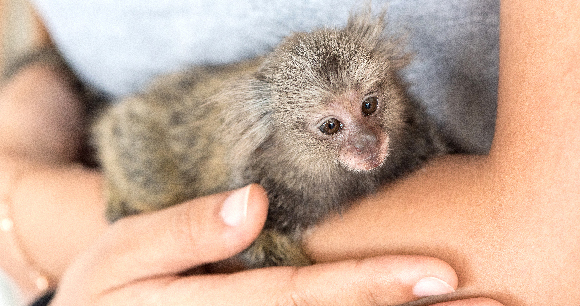
Washington, DC—The Animal Welfare Institute (AWI) supports the reintroduction of the Captive Primate Safety Act (CPSA), which addresses the cruel and dangerous problem of pet primate ownership in the United States. Sponsored by Reps. Earl Blumenauer (D-OR) and Brian Fitzpatrick (R-PA), this bill would amend the Lacey Act to prohibit interstate commerce in nonhuman primates (including apes, monkeys, lemurs, and lorises) for the exotic pet trade.
“The suffering pet primates endure is alarming,” said Cathy Liss, president of AWI. “They are often forcibly removed from their mothers soon after birth, spend their lives isolated in small cages and endure unnecessary, painful procedures such as tooth extraction. The Captive Primate Safety Act is urgently needed to prevent these animals from entering the inhumane interstate pet trade.”
Conservative estimates suggest that there are at least 15,000 primates kept as pets in the United States. About half of all states already prohibit private possession of some or all primate species. Still, a federal law is necessary because primates are easily acquired via the internet or through out-of-state dealers and auctions. For often less than the cost of a purebred dog, a person can buy virtually any species of monkey, but buyers don’t always understand the risks involved or the suffering experienced by captive primates.
“Primates have no place as domestic pets,” said Blumenauer. “It’s dangerous to humans, inhumane to animals and a potential threat to public health. I’m happy to work with Congressman Fitzpatrick and the Animal Protection Caucus to gather support for this bill and bring awareness to this issue so the senseless practice of keeping primates as pets comes to an end.”
In the wild, most primates live in large social groups, but nearly all pet primates are deprived of meaningful contact with other members of their species. Expectations that nonhuman primates will behave like perfectly trained pets or even as "little humans" almost always lead to physical and psychological suffering for the primate.
Pet primates also pose a threat to public safety. Even small primates can inflict serious injuries. Since 1990, approximately 300 people have reported being injured by primates kept by private individuals, although many more incidents likely go unreported. One case that gained worldwide attention occurred in 2009, when a Connecticut woman was blinded and lost most of her face and hands after being attacked by her neighbor’s pet chimpanzee. Additionally, nonhuman primates pose distinct risks to public health since they can easily transmit a wide range of viral, bacterial, parasitic, and fungal diseases to humans.
According to Liss, “Primates are highly intelligent and social wild animals whose needs can’t be met living as someone’s pet. They’re cute and helpless as infants, but even the smallest primates soon become strong and potentially aggressive, posing a threat to the people around them. It is time to put an end to the cruel and senseless pet primate trade.”
Margie Fishman, (202) 446-2128, [email protected]